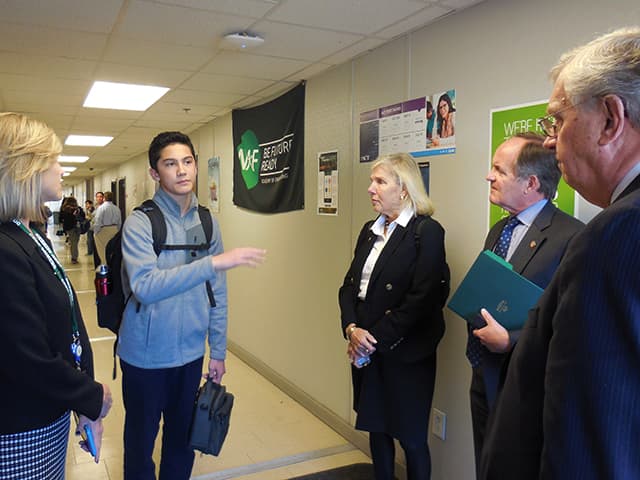Distinguished Alumnus Appointed U.S. Attorney
Andrew Murray (’89) was unanimously confirmed by the U.S. Senate as the next U.S. Attorney for Western North Carolina. In his new role, Murray will lead one of the busiest U.S. Attorney’s Offices in the country, serving more than 3 million constituents in 32 North Carolina counties. He follows in the footsteps of UNC Charlotte alumna Anne Tompkins (‘84), who served as the U.S. Attorney from 2010 until 2015.
A veteran of the U.S. Coast Guard, Murray has a combined 35 years of active and reserve service. Following active duty, Murray attended UNC Charlotte as a nontraditional student, graduating with a Bachelor of Arts in Political Science. After earning a Juris Doctor from UNC Chapel Hill, he began his law career at the Mecklenburg County District Attorney’s Office. Murray also had a successful career in private practice. In 2010, he was elected District Attorney for Mecklenburg County. Murray’s wife, Pam, is an alumna of UNC Charlotte. She earned a Bachelor of Science in Accounting in 1988.

Early College Programs are Changing Student Lives
Rep. Becky Carney, Rep. John A. Fraley and Rep. D. Craig Horn, (pictured above), education leaders within the North Carolina House of Representatives, visited UNC Charlotte to learn about the two innovative early college programs located on campus. The engineering and teacher education programs encourage students to explore STEM and teaching careers. During the visit, representatives spoke with early college students to learn why they choose to attend the programs and to hear how the programs are changing their lives and educational futures.
The Charlotte Engineering Early College (CEEC) is an innovative partnership between Charlotte-Mecklenburg Schools (CMS) and UNC Charlotte. Opened in 2014, the school aims to attract high school students interested in STEM education, with a specific emphasis on energy. There are 325 students enrolled in the five-year program and last year, 75 high school juniors completed an average of 16 college credit hours with an average GPA of 3.2.
Building on the success of CEEC, CMS and UNC Charlotte’s Cato College of Education opened a second early college in August 2017. Forty-nine high school students with an interest in teaching careers enrolled in the five-year Charlotte Teacher Early College (CTEC), the only program of its kind in North Carolina and one of the first in the nation. Coursework develops the knowledge and skills required for success in today’s diverse classrooms. Students graduate with a high school diploma, a Certificate of Advanced Standing in Education and a minimum of 60 hours in course credits transferrable to any public institution in North Carolina.
Keeping Up with Federal Tax Reform
Chancellor Philip L. Dubois, along with UNC President Margaret Spellings and several national higher education associations, has actively worked with members of Congress to advocate for changes to the Federal Tax Reform legislation. In communication with Sens. Richard Burr and Thom Tillis, Chancellor Dubois noted the importance of the three issues below.
Tax-free graduate education tuition assistance: With a fast-growing research program that topped $50 million in external funding for the first time last year, this benefit is particularly important to UNC Charlotte’s graduate students and the growth of graduate programs. Two decades ago, the Charlotte region’s business community led the effort to add doctoral status to UNC Charlotte’s mission. Since that time, the University has added 23 doctoral programs, driven by the industry clusters of most importance to the economic development of the Charlotte region. These programs have been and continue to be, very successful.
Itemizing charitable deductions: Last year, UNC Charlotte launched the public phase of the largest private fundraising campaign in University history: EXPONENTIAL: The Campaign for UNC Charlotte. With a goal of raising $200 million, one campaign priority is to increase support for need-based student financial aid. One concern is the loss of the charitable tax deduction may deter some from beginning a legacy of giving. Thoughts on a solution that would include providing a universal charitable deduction regardless of whether an individual itemizes are welcome.
Athletics directors of many campuses have raised concerns about eliminating the 80 percent tax deduction for seat licenses and privileges. These donations fund scholarships for student-athletes. Many students-athletes come from low-income households; athletic scholarships pave a road out of hardship into self-sufficiency. With a growing NCAA Division I program, this change will greatly thwart our ability to offer these scholarships.
Refinancing of bonds: Finally, an effective financing tool for UNC Charlotte and many campuses is advance-refinancing (refunding) of bonds. UNC Charlotte recently refinanced bonds, resulting in a $7 million savings. These savings will allow the University to redeploy monies for critical repairs and renovations and other capital projects. Absent these tools, these costs would result in the raising of fees, ultimately burdening students.
As Seen on Campus
The following friends of UNC Charlotte were recently spotted on campus:
- Jim Holmes, a member of the UNC Board of Governors, met with Chancellor Dubois and Betty Doster, special assistant to the chancellor, on Nov. 29.
- Michael Regan, secretary of the N.C. Department of Environmental Quality, visited EPIC (The Energy Production and Infrastructure Center) on Nov. 16 to tour the labs.
- N.C. State Senator Jeff Jackson, CMS Legislative Liaison and former State Rep. Charles Jeter and Jonathan Kappler, executive director of N.C. Free Enterprise Foundation, participated in a 49er Democracy campus panel on Nov. 16.
If you have questions or thoughts on the Legislative Briefing, please contact Betty Doster, special assistant to the chancellor for constituent relations.